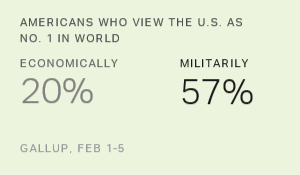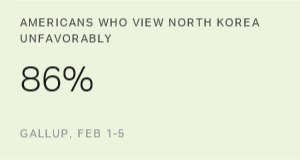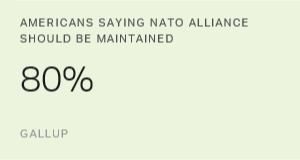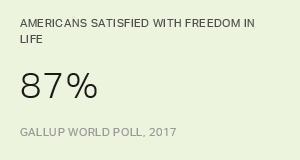Story Highlights
- Current approval rating similar to 38% in 2016
- 60% say the international organization is doing a "poor job"
- Widest partisan gap in views of the U.N. since 2001
Editor's Note: On March 11, 2020, two data points in the line graph by party were updated to reflect the correct data.
WASHINGTON, D.C. -- Thirty-seven percent of Americans say the United Nations is doing a "good job" of solving the problems it faces, similar to what ║┌┴¤═° has measured since 2013 but above the 2009 low of 26%. The latest figure comes as President Donald Trump considers a directive to significantly reduce U.S. contributions to international organizations, including the U.N.

These results come from ║┌┴¤═°'s annual World Affairs poll, conducted Feb. 1-5. The poll finds that a majority of Americans (60%) say the international organization is doing a "poor job," an increase of six percentage points from 2016.
║┌┴¤═° first asked about the U.N. in 1953, when most Americans expressed positive views of the organization. Since then, Americans have become less positive in their views of the U.N.
Despite generally low averages, the U.N. has received majority job approval on select occasions over the past several decades. In addition to the finding in 1953, when the organization was eight years old, the U.N. received majority approval in two polls bookending the Gulf War of the early 1990s and in three consecutive polls from 2000 to 2002. The highest rating the U.N. ever received was in February 2002, just months after the terrorist attacks on 9/11.
However, Americans' positive, post-9/11 views of the U.N. soon plummeted amid disagreements between U.S. leadership and the United Nations over the U.S. invasion of Iraq in 2003.
Widest Partisan Divide in Views of the UN Since 2001
Trump has echoed congressional Republicans' critiques of the U.N. as being ineffectual and financially mismanaged. Some lawmakers have proposed legislation to cut off funding to the organization.
Since 2001, Democrats and Democratic-leaning independents have rated the U.N. more positively than Republicans and Republican-leaning independents have, with Democrats' average approval rating (46%) nearly doubling that of Republicans (24%).
But the gap in party ratings has been growing and is now the largest ║┌┴¤═° has recorded since 2001. While a majority of Democrats (57%) currently say the U.N. is doing a good job of solving world problems, a paltry 16% of Republicans rate the institution's work positively.

Bottom Line
Americans' current approval of the U.N.'s work is similar to the levels seen over the past few years but is higher than the record lows of 2007-2009. The latest rating comes as Trump and the GOP threaten to withdraw U.S. financial support.
Trump's proposal to significantly reduce funding to the U.N. likely comes as no surprise to prominent congressional Republicans. Prior to his inauguration, Trump vowed that "things will be different" for the U.N. once he took office -- a pledge that could materialize if Trump follows through with this directive.
Given the president's recent critiques of the U.N. and Americans' long-standing low approval of the organization since the U.S. invaded Iraq, it is unlikely that views of the U.N. will improve much in the near future.
Historical data are available in .
Survey Methods
Results for this ║┌┴¤═° poll are based on telephone interviews conducted Feb. 1-5, 2017, with a random sample of 1,035 adults, aged 18 and older, living in all 50 U.S. states and the District of Columbia. For results based on the total sample of national adults, the margin of sampling error is ±4 percentage points at the 95% confidence level. All reported margins of sampling error include computed design effects for weighting.
Each sample of national adults includes a minimum quota of 70% cellphone respondents and 30% landline respondents, with additional minimum quotas by time zone within region. Landline and cellular telephone numbers are selected using random-digit-dial methods.
View survey methodology, complete question responses and trends.
Learn more about how the works.




